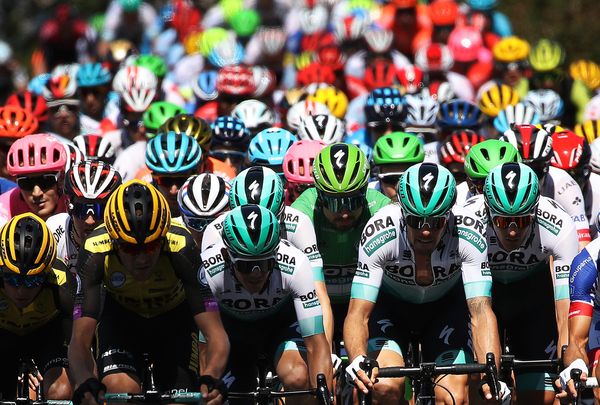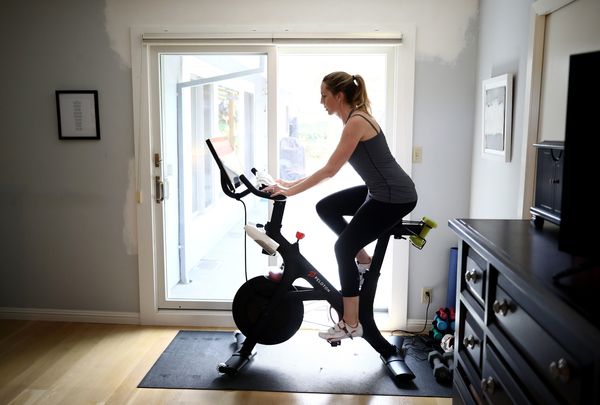And just like that, Peloton has been in the news again.
Yes, the infamous exercise bike made its second unfavorable cameo in another on-screen cardiovascular related fiasco. In the opening moments of last Sunday's "Billions" season premiere, Axe Capital's COO Mike "Wags" Wagner (David Costabile) suffers a heart attack while completing a Peloton workout. Fortunately, Wags survives and later declares, "I'm not going out like Mr. Big!"
Of course, he's referring to Big's (Chris Noth) notorious coronary demise by Peloton in the December premiere of the "Sex and the City" sequel "And Just Like That."
Neither scene casts the stationary bicycle in the best light, running counter to its function to keep people healthy, which couldn't have thrilled Peloton. In fact, the exercise equipment company was initially blindsided by "And Just LIke That" – approving the show's use of its bike but blissfully unaware of its key role in myocardial misdeeds until the episode's release. Peloton attempted to alleviate the negative depiction with a public statement and a now-deleted advertisement starring Noth.
RELATED: "Billions" is better than "Game of Thrones" at studying power, hate and corruption
And as for its use in "Billions," Peloton issued a separate statement via Twitter, once again emphasizing the importance of maintaining cardiac health. The company also disclosed that it did not give the show permission to use its equipment even if the recent publicity got "people talking" about the brand.
It's curious that such similar scenes occurred in such close succession on separate shows on two competing networks. Sure, the Peloton bike has achieved a certain level of popularity and somehow became a household name, standing out among the countless exercise equipment fads. But it's not like the cameos and jokes about the Thighmaster or the Shake Weight – of which there are many – led to such focused or pivotal storylines causing life-or-death situations.
So why all the Peloton hate?
Peloton's wild ride and loss of momentum
 The peloton of leading riders during the 106th Tour de France on July 15, 2019 in Albi, France (Chris Graythen/Getty Images)
The peloton of leading riders during the 106th Tour de France on July 15, 2019 in Albi, France (Chris Graythen/Getty Images)
Like the best cardio bike workouts, Peloton's history has seen its ups and downs. Founded in 2012, the exericise equipment company adopted the word "peloton" from actual bike races, referring to the leading pack of riders who have a complex and symbiotic dynamic in which staying together reduces drag. That sense of cooperation and community informs Peloton's internet-enhanced bikes – the first of which was released in 2014 – that allow its cyclists to participate in streaming classes from anywhere, with anyone else similarly equipped.
In November 2019, the company drew criticism for an ad in which a husband gifts his wife a Peloton, which some saw as the husband criticizing and trying to control her appearance. That wasn't the best PR, but just a few months later, the very people who were offended by the commercial would come to want a Peloton of their own.
The onset of pandemic in early 2020 saw Peloton quickly amass a cult following by those who were now forced to create their own home gyms during lockdown. Long gone were the days of spin classes, like the once-popular SoulCycle or the bankrupt FlyWheel. It seemed that Peloton was the answer to the required isolation, offering the same sense of community and charismatic instructors as the in-person version but in a socially acceptable and safe way.
Is it any wonder Peloton became a favorite of suburban parents, entrepreneurs and Hollywood elite who were united by a shared desire for a healthy escape? It became a way of life, wholly embraced by Beyoncé, Shonda Rhimes, Hugh Jackman and Richard Branson, to name a few.
But now, almost two years later with the omicron variant (and its son!) still keeping folks at home, the company is experiencing a drop in demand and a financial downfall that continues to take hits week after week. And sure, after "And Just Like That" killed Big, Peloton's stocks plummeted 12%, but that was only continuing a downward trend that started in November.
In fact, just before the Christmas season, people had begun selling their Peloton bikes for discounted prices on Facebook Marketplace, Craigslist and eBay. In one cheeky Instagram post, a seller bid adieu to his bike with the caption: "And Just Like That . . ."
Peloton: A bicycle built for few
 Jen Van Santvoord rides her Peloton exercise bike at her home on April 7, 2020 in San Anselmo, California (Ezra Shaw/Getty Images)
Jen Van Santvoord rides her Peloton exercise bike at her home on April 7, 2020 in San Anselmo, California (Ezra Shaw/Getty Images)
While not responsible for tanking Peloton, these TV shows – which take many months even possibly a year to produce – already had the temperature of the workout room so to speak. While "And Just Like That" and "Billions" had the most damning portrayals of the bicycle, one other show also featured a far kinder, and yet still revealing, version of Peloton.
In the second season of Netflix's "Emily in Paris," the Savoir marketing team is pitched to create a campaign for the thinly veiled parody of the bike called Pelotech, which promises a "heart-pumping cardio experience that connects riders to a worldwide fitness community." Emily Cooper's (Lily Collins) boss Sylvie (Philippine Leroy-Beaulieu) expresses disgust towards the bike, which she says fails to capture the joie de vivre of France's outdoors. Luc (Bruno Gouery) questions the practicality of the Pelotech: "Why would anyone want this when you can ride outside?"
By the end of the episode, Savoir has refused to take on the campaign and the sample bicycle even goes missing. Later, viewers discover that none other than Sylvie has swiped the Pelotech so she can experience the cardio experience in the privacy of her own home.
Want a daily wrap-up of all the news and commentary Salon has to offer? Subscribe to our morning newsletter, Crash Course.
What do all portrayals tell us about how the public sees the brand?
Big and Wags embracing Peloton demonstrates how the bicycle is perceived to be intended for the privileged, the rarefied elite who meet with rather ridiculous fates brought on by their pricey equipment. It is not Peloton per se that is at fault, rather who Peloton represents that is being skewered here. Harming them is a bit of Robin Hood justice, but all in fun!
These are affluent, middle-aged individuals who have ample amounts of space to accommodate the bike indoors. In an interview with CNBC, Peloton's CEO John Foley described the brand's target demographic as "people who have children, live in suburbs, have nice homes . . . have the money and space but don't necessarily have time." Nevertheless, these same parents must have the means to afford child care or find some other means of occupying their children's time even if they're home-schooling.
 Philippine Leroy-Beaulieu as Sylvie Grateau, Lily Collins as Emily, Camille Razat as Camille in "Emily in Paris" (Carole Bethuel/Netflix)
Philippine Leroy-Beaulieu as Sylvie Grateau, Lily Collins as Emily, Camille Razat as Camille in "Emily in Paris" (Carole Bethuel/Netflix)
Even the relatively positive portrayal of the Pelotech in "Emily in Paris" reflects a leery lack of respect for the bicycle. As with many new pieces of technology it is suspect, as we see in its reception by the Savoir team. And though Sylvie ultimately embraces the bicycle for her own use, it is done privately, even shamefully. She knows that image is everything – she's in marketing! And the image of the Pelotech, even for a luxury brand company, is of an extravagance that isn't desirable or necessary.
RELATED: "Emily in Paris" is aging well
Ultimately, what many people who jumped on for the Peloton ride found in the real world was what many others have learned during the pandemic: It's challenging to exercise on one's own. Other pieces of home gyms – ranging from resistance bands to power towers – are also being sold off, unused despite the best of intentions. The Peloton bike also isn't the only smart tech stationary bike out there, but it's one of the more expensive ones if you want the package add-ons. Having its expensive bulk in one's home is a reminder of one's folly and failures.
Similarly, the lure of virtual classes doesn't live up to the hype. Besides screen fatigue, virtual interactions are limited and simply do not replace in-person ones. That Peloton instructor who married another instructor might be your favorite, but you cannot have real conversations with them. Ditto for your fellow riders.
This is not to say that the Peloton is not a good product. It's an excellent piece of equipment, especially for those whose accessibility needs can't be met by attending a public gym. It also probably works best for those who were already devotees of cycling or spin or exericising from home. But for those new to the cult of Peloton, we found it did not solve all of our problems; it is just a bike.
Peloton, which was once described as "the Netflix of wellness," had invaded our homes and then our TVs. But it's size, price tag and impracticality ultimately wheeled it out of our hearts.
More stories you might like:



Shares